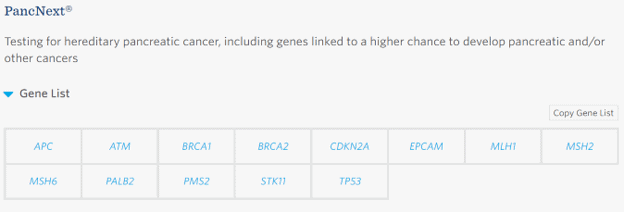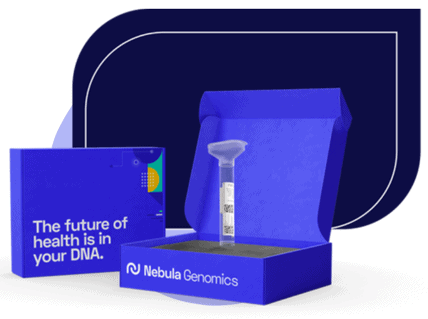Table of contents
Introduction on Pancreatic Cancer
Pancreatic cancer is a type of cancer that develops within the tissues of the pancreas. The pancreas is a vital organ located behind the stomach and aids digestion by producing enzymes that help the body digest carbohydrates, fats, and proteins. Read more to learn about how pancreatic cancer genetic testing can help diagnose and treat this disease!

Pancreatic cancer is extremely difficult to detect due to the location of the pancreas, and even at an advanced stage, symptoms may not be clear enough to pinpoint the condition. In most people, the symptoms, while evident, can be general and confused with those of other ailments even in the most advanced stages of the condition. The symptoms include:
- loss of appetite
- unintentional weight loss
- abdominal or lower back pain
- blood clots
- jaundice (yellow skin and eyes)
- depression
It is almost impossible to diagnose pancreatic cancer in its early stages. In almost all cases, it is diagnosed at the most advanced stage (commonly termed stage 4) after it has spread to other parts of the body like the liver and the bone.
One way to keep ahead of pancreatic cancer is to perform genetic tests to determine if you have certain genetic variants that indicate a predisposition to the condition. If you discover certain genes, you and your doctor may want to discuss additional screening tests for early detection and prevention plans.
Once an individual has been diagnosed with pancreatic cancer, usually through endoscopic ultrasound or other imaging test, various treatments can be carried out. Unfortunately, there is no cure for it in its most advanced stage. Treatment may relieve the symptoms and prevent further complications. Some of the treatments that can be performed include:
- Chemotherapy
- Palliative pain treatments
- Bile duct bypass surgery
- Bile Duct Stent
- Gastric Bypass Surgery
Why Pancreatic Cancer Genetic Testing?
Pancreatic cancer’s cause is unknown, but there are certain risk factors that may increase your risk. These include:
- Smoking
- Diabetes
- Chronic inflammation of the pancreas
- Obesity
- Age
Additionally, there are also genes associated with increased risk of the condition. To have an idea on whether you are at a high risk, you can sequence your genome to see whether you carry any of these genetic mutations. People with family members who have a history of pancreatic cancer should consider asking a health care professional for recommendations on genetic testing.
BRCA1 and BRCA2
BRCA 1 and BRCA 2 mutations are majorly related to inherited breast and ovarian cancer caused by germline mutations. They have, however, been found to increase the risk of a person developing pancreatic cancer. BRCA 1 has been found to trigger a small increase in the risk of pancreatic cancer. The BRCA 2 gene holds much higher risk and significantly increases the risk of pancreatic cancer development.
MLH1
This is a gene that helps correct errors in the DNA. When there is a mutation of this gene, DNA damage may go on unchecked, leading to serious development of malignant cells in the pancreas.
PALB2
At least 1 to 3% of pancreatic cancer patients with familial pancreatic cancer have been found to have inherited mutations in the PALB2 gene. Mutations in the PALB2 gene are also associated with an increased risk of breast cancer.
CDKN2A
Mutation of the CDKN2A gene poses an increased risk, with up to 40% of inherited familial cases of pancreatic cancer having mutations of this gene.
TP53
While the TP53 gene mutation is common in ovarian cancer, it is much more related to increasing the risk of pancreatic cancer. It is one of the most frequently mutated genes in all cancers and is mutated in 70% of pancreatic cancers.
ATM
The ATM gene is one of the common gene mutations associated with an increased risk in almost all types of cancer development. It has been reported that it is associated with an increase in the risk of pancreatic cancer.
Pancreatic Cancer Genetic Testing Companies
There are a number of companies that offer genetic testing for pancreatic cancer, and this article will consider some of them. Family history of pancreatic cancer may be a large deciding factor for you and your doctor when considering these tests.
Fulgent Genetics for pancreatic cancer genetic testing
Fulgent Genetics is a clinical hereditary genetic firm that focuses on hereditary testing. The company is well known for testing hereditary cancer and tumor profiling.
This firm carries out all types of hereditary cancer tests, including pancreatic cancers, with up to 22 genes being examined in its test. A healthcare professional can order a test kit on your behalf and analyze the results, sometimes in collaboration with a genetic counselor.

Price: This diagnostic testing may be covered by insurance or patients can choose to self pay. The company does not reveal the price of their test kits and requests that potential customers call them for details.
Visit our review on Fulgent Genetics to learn more about how the company provides genetic testing, costs, reports, and much more.
Ambry Genetics for pancreatic cancer genetic testing
Ambry Genetics is a genetic testing and clinical diagnostic company that offers tests through physician prescriptions. Like other diagnostic tests, these kits may be covered by insurance.
Ambry Genetics performs genetic testing for many types of hereditary cancers, including pancreatic cancers. The company offers either a specific test for pancreatic cancer genes, called PancNext®, or they can test for the affected genes with their comprehensive cancer screening.

The comprehensive ‘CustomNext-Cancer’ and the ‘CancerNext-Expanded’ tests cover genes that are associated with increased risk of pancreatic cancer development. The first test examines 91 genes, while the second test accesses 77 genes. Both tests include all relevant genes that are known to cause pancreatic cancers
Price: Ambry genetics tests are on the high side, with the price of an insured user hovering as much as $100 or more.
While the company does not disclose the price of a non-insured patient, there have been several claims by several users that the price ranges over $3000.
Visit our review on Ambry Genetics to learn more about how the company provides genetic testing, costs, reports, and much more.
Nebula Genomics
In many cases, diagnostic companies will be able to provide the most comprehensive and clinically relevant results when pancreatic cancer is suspected, especially if you are showing symptoms. However, these tests require a physician’s approval and analysis.
Consumer genetic testing companies fill in the gap for many customers who may not be approved for diagnostic tests, but are interested in assessing their genetic risk for disease. These tests can be ordered online and completed at home. Then, they are typically mailed back to the lab and results are provided directly to the customer.

Nebula Genomics is among the top at home DNA test platforms. With its 30x whole genome sequencing (WGS), they decode 100% of your DNA, compared with less than 1% decoded from similar at-home tests. With whole genome sequencing, you can identify all pancreatic cancer-related genes and see how you are at risk of developing pancreatic cancer. Plus, you will have access to your entire genome, to answer questions on your predispositions from cancer to hair color.
In addition to health and physical traits, Nebula Genomics also provides access to deep ancestry and weekly updated reports based on the most recent medical and scientific research.
If you liked this article, you should check out the other posts in the Genetic Cancer Testing series and explore the Nebula Research Library to learn about hundreds of other conditions influenced by genetics, including many cancers.
Other cancers:
- Colon Cancer Genetic Testing
- Genetic Testing for Breast Cancer
- Genetic Testing For Prostate Cancer
- Ovarian Cancer Genetic Testing
- Lung Cancer Genetic Testing
- Genetic Testing for Thyroid Cancer
Get your genome sequenced to receive personalized reports on all these conditions today!
September 21, 2021
Edited by: Christina Swords, Ph.D.
